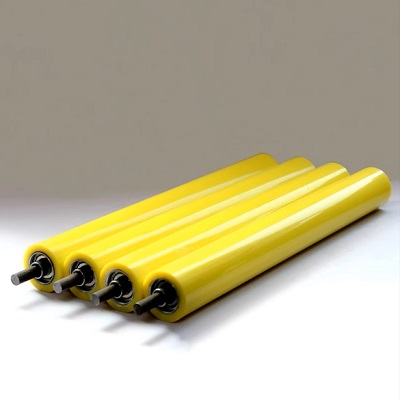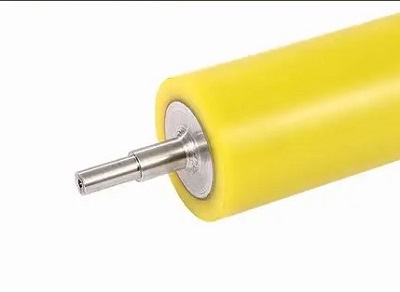
What are Polyurethane Rollers?
Simply put, polyurethane rollers are cylindrical components with an outer layer of polyurethane. Polyurethane is an exceptionally durable elastic material that provides excellent protection to the inner core of the rollers. After all, the inner core is prone to scratches, corrosion, and even dents in different working scenarios. Fortunately, the polyurethane coating excels in wear resistance and impact resistance, which can just solve these problems. These rollers have a wide range of uses in the manufacturing industry. They can handle tasks such as printing, material conveying, extrusion, pressing, lamination, feeding, coating, spreading, and grain milling. Among elastomeric materials, polyurethane is the first choice for making rollers. By adjusting the types and proportions of additives, rollers with various properties can be produced to fully meet different needs. What makes it most popular is its high toughness, good impact resistance, effective shock absorption, and resistance to fatigue from repeated use. Moreover, the flexible polyurethane formula allows for the production of both hard and sturdy rollers as well as soft and elastic ones. There are various hardness levels available, which can be customized according to specific requirements. As an elastomer, it can also be thermoformed into various shapes, making it highly applicable.

What are the Advantages of Polyurethane Rollers?
Like rubber products such as nitrile rubber and neoprene, polyurethane rollers belong to the category of versatile elastomers, with excellent elasticity and resilience. This makes them an ideal choice for many industrial fields such as conveying systems, printing, packaging, manufacturing, and food processing. Compared with traditional rubber rollers, they have better mechanical properties, superior chemical resistance, and a longer service life. Thanks to their outstanding performance, they have begun to replace rollers made of other materials in harsh environments that have high requirements for durability, safety, and efficiency. Specifically, their advantages are mainly as follows:
Excellent load-bearing capacity and impact strength: Under high loads and repeated impacts, polyurethane rollers can maintain structural integrity. They are particularly suitable for heavy industries such as mining, automobile manufacturing, and warehouse automation, where they are used as conveying rollers, drive rollers, and material handling rollers. With both flexibility and toughness, they can help absorb vibrations, reduce noise, and prevent fragile items from being damaged during transportation or processing.

Easy to process and customize: Compared with many elastomeric materials, polyurethane is easy to process and has high cost-effectiveness. Whether it is open casting, injection molding, or extrusion, only basic mixing equipment is needed, and there is no need for complex high-temperature curing processes. This enables the quick production of custom rollers and sleeves of various shapes, diameters, and hardness levels, meeting both small-batch and large-scale production needs. Furthermore, the ability to customize polyurethane roller coatings for specific sizes or special functions (such as anti-static, high friction, and color coding) is of great value to original equipment manufacturers, repair shops, and industrial engineers who value precision and versatility.
No marks left on products and surfaces: The linings of traditional rubber rollers contain carbon black as a filler and reinforcing agent, which tends to leave visible streaks or scratches on finished products and precision surfaces. However, polyurethane rollers are specially designed to avoid this situation. In industries that have high requirements for product appearance and cleanliness, such as electronics, printing, pharmaceutical production, medical device assembly, and food processing, this mark-free feature is extremely important, and it also plays a key role in quality assurance and pollution control.
Strong resistance to water, oil, and environmental factors: The molecular structure of polyurethane gives it strong resistance to water intrusion and oil absorption, ensuring stable performance in both dry and humid processing environments. This is essential in situations where rollers are often exposed to cleaning fluids, detergents, food-grade lubricants, or corrosive liquids, such as bottling plants, commercial bakeries, industrial laundries, and printing workshops. In addition, it is resistant to ozone, ultraviolet rays, and many chemicals, greatly reducing the risk of swelling, hardening, or cracking over time, which is common in other elastomers.